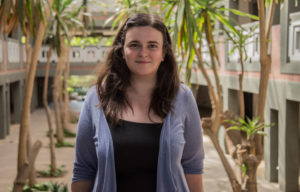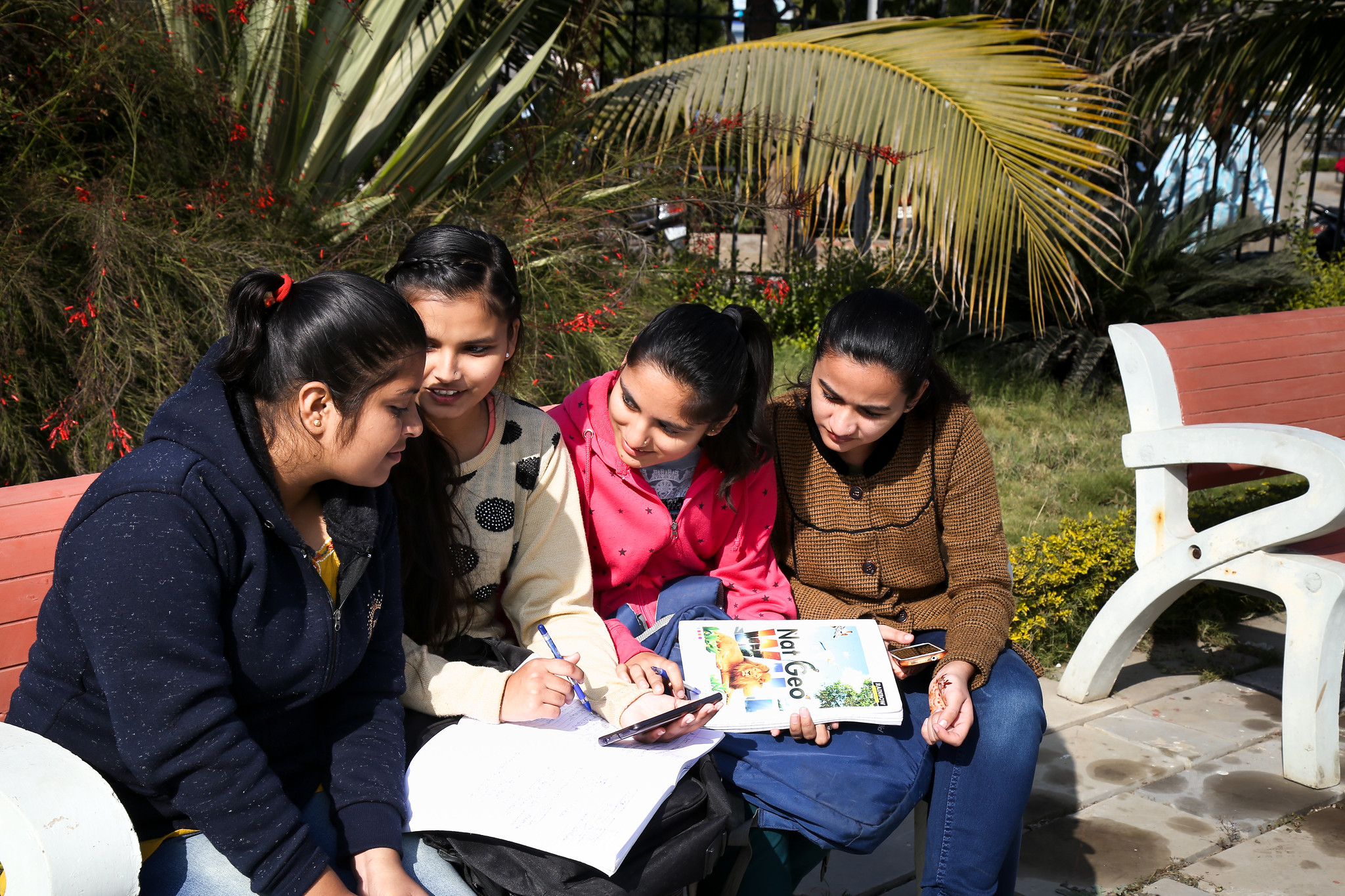Young people should play a crucial role in addressing both current and future global challenges. Today on World Youth Skills Day, we are sharing the thoughts, experiences, and ideas of three young experts from the Young Experts: Tech 4 Health (YE:T4H) on the skills necessary for young people to meaningfully contribute to the recovery efforts post-COVID-19, how we as a foundation best can support young people during these challenging times, and the role of technology in accelerating the recovery efforts.
About YE:T4H
YE:T4H was formed to provide independent insight and counsel to Digital Transformation for Universal Health Coverage 2030, a global coalition aiming to champion the role of digital innovation to achieve quality healthcare for all. Alongside Fondation Botnar, the founders of the coalition include Partnership for Maternal, Newborn & Child Health (PMNCH), PATH, and Women Deliver.
Danielle Mullings
 Danielle Mullings is a Jamaican software engineer who loves to make documentaries. She currently serves as the president of the Faculty of Science and Technology, University of the West Indies Mona. Follow Danielle on Instagram @damullings.fst and Twitter @damullingstweet.
Danielle Mullings is a Jamaican software engineer who loves to make documentaries. She currently serves as the president of the Faculty of Science and Technology, University of the West Indies Mona. Follow Danielle on Instagram @damullings.fst and Twitter @damullingstweet.
How do you think young people best can contribute to the recovery efforts post COVID-19?
The post-COVID-19 era will require immense creativity and resilience. Young people have a chance to help restructure societal norms as a new paradigm is being built. We are at the helm of the most powerful tools for connection in modern-day history – social media. Therefore, we have a responsibility to use these platforms to speak in favor of equitable healthcare, equality for all minority groups, and hold our leaders accountable to higher standards than before. As a Young Expert in Tech for Health, I lend my voice to the amplifying the use of technology to advance equitable healthcare.
What role do you think technology could play in the recovery efforts post-COVID-19?
Technology has been a great enabler for societies during the pandemic. It has been used to sustain most if not all facets of life including education, remote work, and even virtual parties for relaxation. The post-COVID-19 era will see an increased reliance and realisation of the importance of technology in our day to day lives. Tech will take on a heightened role as the “enabler”. I wish to see it being used to reach more vulnerable groups, such as utilizing drones to deliver food and healthcare products to remote areas.
What risk do you see that young people post COVID-19 will be facing?
The economic impact of COVID-19 is one of the greatest risks to young people. Young people were already disproportionately affected by unemployment, but COVID-19 has furthered job insecurity worldwide. In addition to financial uncertainty, students are faced with the question of how to receive the same quality of education virtually, especially for practical degrees in the sciences. However, of all the risks, I am most concerned about the mental wellbeing of young people post-COVID-19. The pandemic has instigated rapid change across all facets of life, increased anxiety levels, and general uncertainty for all.
Lucy Fagan
 Lucy Fagan is a public health doctor and passionate youth advocate. She currently works in the NHS, supporting some of the UK’s hardest-hit communities to respond and recover from the COVID-19 crisis. Follow her advocacy work on Twitter at @CWYouthHealth and @UNMGCY.
Lucy Fagan is a public health doctor and passionate youth advocate. She currently works in the NHS, supporting some of the UK’s hardest-hit communities to respond and recover from the COVID-19 crisis. Follow her advocacy work on Twitter at @CWYouthHealth and @UNMGCY.
How do you think young people best can contribute to the recovery efforts post COVID-19?
As young people, we are uniquely placed to understand the realities and challenges faced by our communities. We are also not afraid to speak up and act for a better future. Now we are ready to contribute and lead recovery efforts – innovating, mobilising, spearheading new movements for social, economic, and environmental justice, and driving accountability efforts to ensure no-one is left behind in our new normal. Many of us are already leading the way in delivering this future – leveraging our skills to change the world around us and shaping new solutions for a post-COVID era.
This pandemic has taught us the importance of claiming our power, our agency, and our rights – so expect to see us on the frontlines of action and advocacy as we work to build a better world.
What skills do you think will be key for young people in cities to thrive in the future?
It is not just about what skills young people need, but how they learn them. No matter where we live, whether London or Lagos, we need safe and supportive environments that allow us to learn through experience and where we are enabled to engage and apply ourselves. Furthermore, for those of us growing up in cities today – we need emotional and interpersonal skills as much as technical ones. Skills like empathy, personal resilience, the ability to communicate effectively, cultural intelligence, and decision-making are all critical to thriving in a complex future – and create more equitable, prosperous urban communities where every young person can reach their full potential.
Sahil Tandon
 Sahil is a researcher and strategist with the Packard Foundation in India. He is passionate about the development and rights of adolescents and young people, especially from a lens of inclusion and intersectionality. Follow Sahil on Twitter @ssahiltandon.
Sahil is a researcher and strategist with the Packard Foundation in India. He is passionate about the development and rights of adolescents and young people, especially from a lens of inclusion and intersectionality. Follow Sahil on Twitter @ssahiltandon.
How do you think young people best can contribute to the recovery efforts post COVID-19?
Young people today don’t only make up a larger portion of the global population but are also participating more in shaping social movements and discourses. As changemakers, young people can play a crucial role in ensuring that social agendas and developmental approaches are resilient, not only robust but also adaptable, as we look to a period of recovery in the wake of COVID-19. Being digital natives, young people can be pivotal in efforts to connect diverse communities and contexts, amplifying the voices of all people and share their lived realities in inclusive and respectful ways, and foster a greater understanding and empathy towards diverse needs and realities, contributing to a transformative framework for global development in the post-COVID era.
What risk do you see that young people post COVID-19 will be facing?
COVID-19 has revealed significant cracks in the existing social order, further marginalising already disadvantaged segments of the population. The turn of the health pandemic into a socio-economic crisis has exacerbated the precarity of individuals, and young people owing to their age-vulnerability, are often at the receiving end of this. The current crisis portends a future in which young people could experience greater social, economic, and political insecurity, deprivation, discrimination,, and dependence. In the absence of targeted interventions to safeguard their interests and invest in their abilities, young people could be further disadvantaged, with possible long-term impacts on society as a whole.
How do you think we as a foundation best can support young people?
Fondation Botnar, owing to its unique funding focus and perspectives around the potential of young people, can support them by enabling and investing in skills and tools, that not only safeguard but also enhance their abilities, and creating spaces and platforms for young people to engage with and influence the agendas around their rights and the future. To actualise the role of young people as catalysts for a better tomorrow, we must recognise their unique abilities, needs, experiences, and wisdom, and make them a central and meaningful part of the way forward.
Follow the Young Experts on Twitter here to learn more about their important work and read a recent blog here from the experts on Understanding Youth and COVID-19: Impact and Opportunities.
